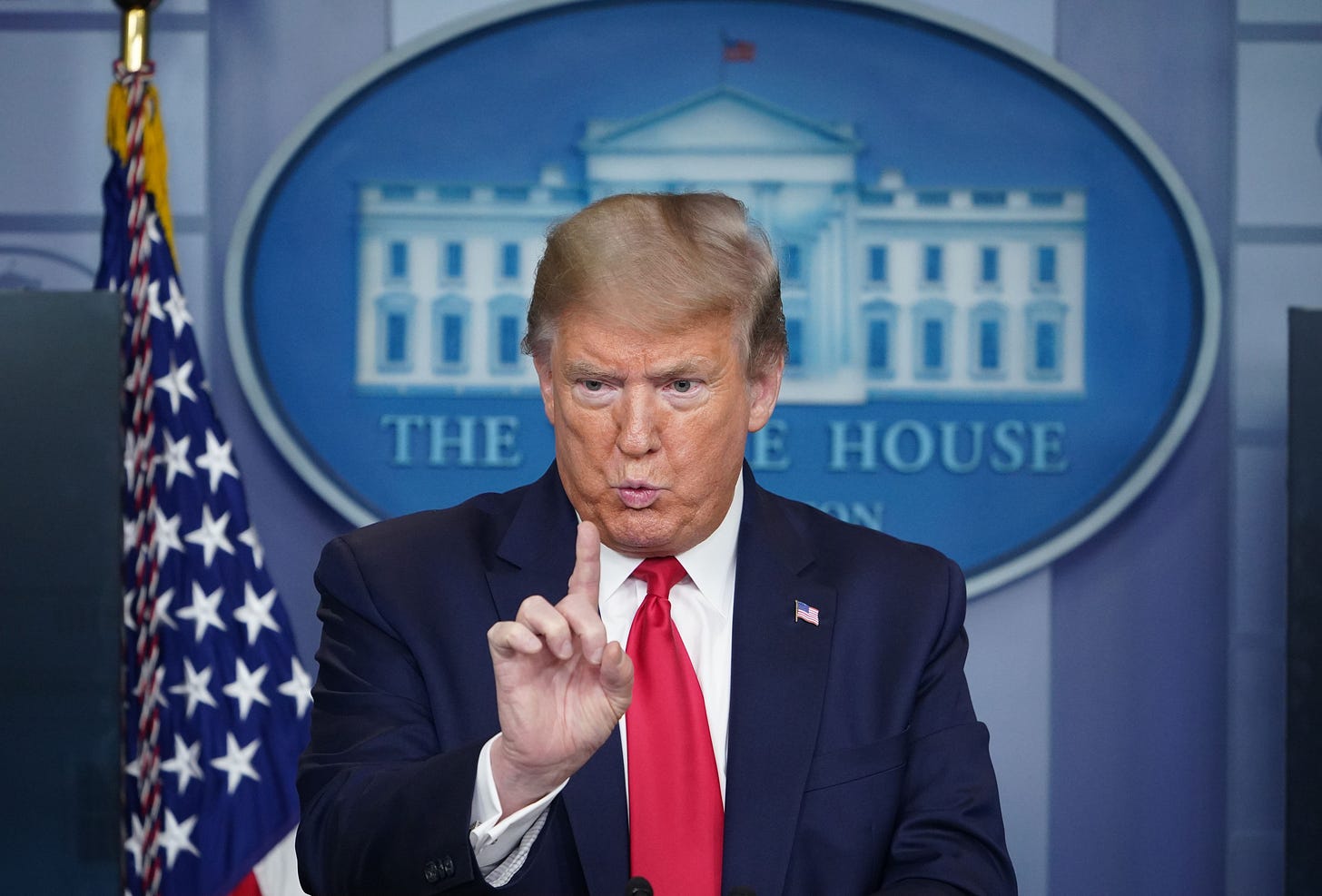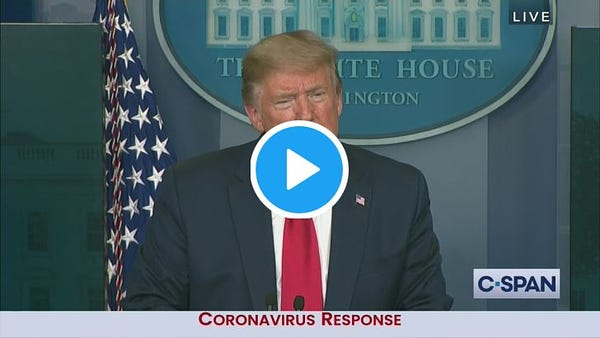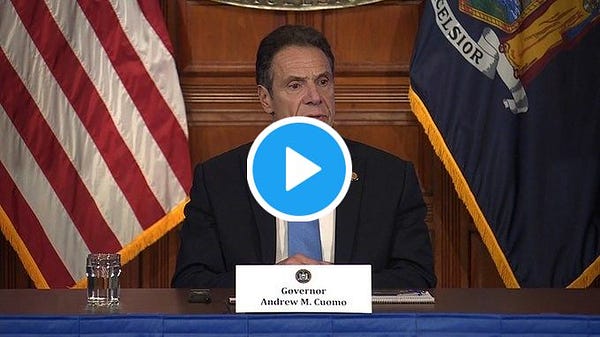
(Trump speaks during the daily briefing on the novel coronavirus on April 13, 2020, in Washington, DC. Photo by MANDEL NGAN/AFP via Getty Images.)
Trump told reporters at Monday’s press conference that he not only has the complete authority to re-open the country, but that his authority over local leaders is “ultimate” and granted by the U.S. Constitution. Trump further clarified his position by saying, “When somebody is the president of the United States, the authority is total and that’s the way it’s got to be. It’s total. The governors know that. [Local leaders] can’t do anything without the approval of the president of the United States.”
This claim to complete authority over the actions of the states during this pandemic was supported by Vice President Mike Pence, who repeated similar Trump sentiments during the same briefing telling reporters, “Make no mistake about it, in the long history of this country, the authority of the president of the United States during national emergencies is unquestionably plenary.”
The Trump administration made a point to double down on this incorrect legal assertion on the same day that many governors across the country had begun to publicly announce their plans for re-opening their individual states in light of the coronavirus pandemic.
Trump’s assertion of absolute power over states in this instance is not only false, it has no real legal support in any context. Even the concept of a federal emergency does not override the basis of Separation of Powers and the reservation of states rights found in the 10th Amendment to the Constitution.


Trump supporters have been quick to throw out phrases like “Supremacy Clause” and “Commerce Clause” in order to defend Trump’s assertion that the federal government can usurp the power of the states in this instance. Firstly, Trump made the claim that his power was “ultimate” and “absolute,” which essentially implies a sweeping and all-encompassing power that he is not entitled to.
Secondly, these clauses found within the Constitution give exceptions for instances that are not applicable in this case. Ultimately, the right of the states to determine when they will re-open their activities in the midst of this pandemic falls squarely under the police powers reserved by the Constitution to the states, not to the federal government.

Each state made the determination about when activity within the state would shut down or partially cease — this was done using the authorities afforded to the states to quarantine and isolate. The power to quarantine is one of the states' oldest powers and the president lacks the authority to direct governors, mayors or other local officials to lift emergency orders made within this capacity. Even though state laws vary widely with regard to how this power is enacted, governors or state public health officials ultimately have the authority to limit public interactions in emergencies.
Trump has already started to spin the illusion of competence with regard to the federal government’s role in the re-opening of America. Trump announced the formation of the “Opening Our Country Council” and has promoted the endeavor as a team of economic experts, medical professionals, elected leaders and members of the business community. The name in itself is stellar and rivals “Be Best” for the most grammatically awkward way to say nothing.
But reports are already surfacing that many business leaders are hesitant to sign on to this panel for fear of media scrutiny and the possible loss of any future government financial assistance they might be receiving. According to NBC News, executives are leery of being involved in a panel that could become as controversial as Trump's earlier forays, such as the "Strategic and Policy Forum" and the "American Manufacturing Council."


New York Governor Andrew Cuomo made a point to explain how his state would proceed with re-opening cautiously, while making it clear that the post-coronavirus plan would not involve a federal directive. During his daily news briefing Monday, Cuomo said the reopening process in his state would happen in stages in coordination with other parts of the Northeast and could take as long as 18 months due to the length of time required to obtain a vaccine for the virus.
When asked about the president’s latest remarks about ultimate authority over states with regard to the re-opening, Cuomo explained that this approach by Trump is simply unconstitutional. In the video above he explains why the police powers for each state are not relegated to the federal government and equates this notion with the actions of a king, a comparison that is not unfamiliar for Trump.

It’s hard to say where Trump’s latest declaration of absolute power was derived in this instance. It’s possible he had a briefing from an overzealous aide who was ignorant to the practicalities of Constitutional Law and googled “Interstate Commerce.” It’s also possible that a briefing occurred and a discussion of federal power was in play and Trump simply misunderstood what he was told.
It will be interesting to watch him continue to tout absolute power from behind his podium while each governor makes their own decisions on resuming activity, very publicly. This appears to be another instance where the country makes a collective eye-roll, while ignoring what the President of the Unites States is saying as they proceed with doing the actual heavy lifting.
Your paid subscriptions allow me to keep publishing critical and informative work that is often made available to the public. If you like this piece and you want to support independent journalism from a female perspective, you can forward this article to others or send a gift a subscription to someone else today.
Amee Vanderpool writes the “Shero” Newsletter and is an attorney, contributor to magazines and newspapers and analyst for BBC radio. She can be reached at avanderpool@gmail.com or follow her on Twitter @girlsreallyrule.



You are correct in everything you write here.
What I am concerned about is that this matter could well end up before the Supreme Court. (I am pretty sure, BTW, that behind this assertion is William Barr, who's been claiming broad presidential powers for a long time.) My thinking is that the governors could well sue to prevent this illegal assertion of power; this is clearly a basic Constitutional issue. The Court, as it is constituted now, is very likely to agree with any assertion of broad presidential power and if it did this, we are no longer governed by a Constitution. We are, legally, an authoritarian regime. The fallout from such a decision, at the street level, is likely violence and chaos because the trumputin cult will exert their leader's power against whomever they dislike, such as the driver with the Biden sticker on the window.
Okay, I am taking this supposition to an extreme but, given the last three-plus years of violations of the Constitution, accepted mores and behavior by this president*, and his multiple blatant assertions of absolute power yesterday, I don't think I am being hysterical in imagining this.
As others have pointed out, whatever doubts we had about his desire to be a dictator have now been dispelled.